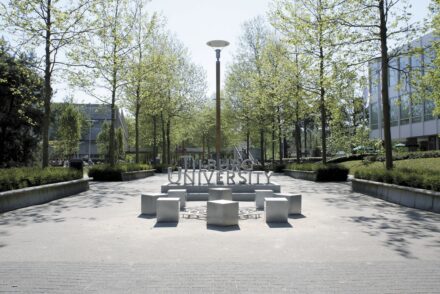Which party will you vote for? Elections for student representation begin today
Today marks the beginning of the annual elections for student representation at Tilburg University. Students can vote until Thursday for both the University Council and their own Faculty Council. But why are there elections, how can you vote, and who can you vote for?

From April 29 to May 1, students can cast their votes digitally via this portal. Once logged in, students can vote twice: once for the University Council and once for the Faculty Council. It’s a bit like voting for both the national elections and the local elections at the same time: each council influences different aspects of your life as a student.
The elections for student representation are political in this sense. As a student, you have a say in the decisions made by the university. It’s actually a mini-democracy, where you decide who enters the council and, thus, who has a say in everything that happens on campus.
The University Council
The University Council acts as the Dutch Parliament (the Tweede Kamer) of the university. The parties participating in the council are tasked with overseeing the Board of Governors (CvB). This means the CvB, led by Rector Magnificus Wim van den Donk, cannot make decisions without consulting the nine staff members and nine students who form the council. They offer input, critique, advice, and can either approve or reject proposals.
Front, SAM, and Progressive Student Alliance
For a long time, Tilburg University only had two student parties: Fractie Front and Fractie SAM. Currently, Front is the largest party, holding five seats in the council, while SAM has four. For the first time, a third party, the Progressive Student Alliance (PSA), is participating.
Although all three parties aim to represent student interests, they have different priorities. Front mainly focuses on the active student and advocates for hybrid education. The party also believes there should be more attention given to using AI applications in education.
SAM positions itself as the party that seeks to represent the interests of all students. In this election, SAM is focusing on digitalization. For example, the party wants a digital student ID card.
The new party, PSA, has eight key points. The most important? A boycott of Israeli universities, more public debate, and a more democratic governance structure.
Faculty Councils
The University Council is the central student representation body at Tilburg University. It discusses major policy guidelines, but within this framework, faculties have room to make their own decisions, similar to how municipalities work. Each faculty has its own dean, teachers, researchers, and students.
Tilburg University has five faculties: Tilburg School of Economics and Management (TiSEM), Tilburg Law School (TLS), Tilburg School of Social and Behavioral Sciences (TSB), Tilburg School of Humanities and Digital Sciences (TSHD), and Tilburg School of Catholic Theology (TST). There are no elections for the TST faculty.
Most faculties have two parties. Typically, there is an ‘Active’ party, and another student party. Some faculties also have single-member factions running for election. For example, at TSHD, you can choose from Active TSHD, Endurante, or one of the single-member factions.
Campaign
In short, there’s plenty to choose from. Starting today, the campus will once again be flooded with parties trying to convince students to vote for them. Banners, market stalls, and merchandise will color the campus around election time in the party’s characteristic colors: blue for SAM and green for Front. The different parties will present their positions, hand out flyers, and engage with students to win their votes. The results will be announced on Friday, May 2, at 1:00 PM in a public session in the Marga Klompé building.






